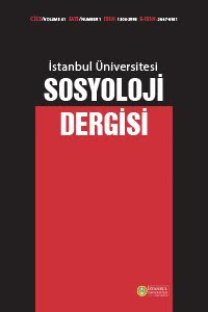EDEBİYAT VE ÖTESİ: MORE'UN ÜTOPYA'SINI BAĞLAMSALLAŞTIRMAK
Bu makale Rönesans'ın hem kişisel hem de toplumsal planda benzeri görülmemiş ve karmaşık arka planında More'un Ütopyasını ele almaktadır. Makale edebi metni en azından yazarı kadar çağı tarafından da üretilen, muhtelif belirsizliklerle dolu bir çağı içine çeken, bir araç olarak ele almaktadır. Hümanist bir sosyal eleştirinin içerisinde konumlanan Ütopya aynı zamanda mutlakçı ve radikal olarak ilerlemeci, formatı itibariyle seçkinci ideal bir durum varsayar. More için bir kendini geçersizleştirme ve ifade etme aracı olarak Ütopya, pratik hümanizm ve olgunlaşmamış burjuva ideolojisinin sıkıntılı karışımından kaynaklanan belirsizlik ve karmaşa üzerinde gelişmektedir. Ampirik nesnelliğin ve imparatorluk inşa etmenin çelişkili yapısı eğlenceli entelektüel alıştırmalar ve ciddi amaç More'un 'ütopik mutlu ülkesini' edebi artalan ile edebiyat ötesi itibarlar arasında ilişkiler kuran ideolojik mücadelenin mahalli yapar. Makale; metnin yapısal biçimine, terkibinin kökenine, ikincil anlamların geniş kullanımına, hegemonik seküler yönelimine, cumhuriyet vurgusuna, para ekonomisinin kaldırılmasına ve radikal duygu karmaşalarına rağmen kendini geçersizleştirme ile kendini zorla kabul ettirmenin sürekliliğine odaklanmaktadır. More'un Ütopyası İngiliz edebi aygıtının sosyal sistemlerin eleştirisinde kullanımının ergenlikten yetişkinliğe geçişini simgeler.
Anahtar Kelimeler:
More, Ütopya, Sosyal Ele~tiri, Edebi Bağlam
Literature and Beyond: Contextualising More's Utopia
This article attempts to foreground More's Utopia against the Renaissance backdrop of complex and unprecedented transformations both on the individual and the collective plain. It investigates the text as a literary artefact produced as much by its author as by the age imbibing the multifarious ambiguities and uncertainties of a transitional era. Located within the tradition of humanist social criticism, it posits an ideal state that is simultaneously absolutist and radically progressive, inclusive in format yet elitist in dissemination. A vehicle for self-cancellation and self-transference for More, Utopia thrives on the paradox and ambivalence resulting from an uneasy miscegenation of practical humanism and nascent bourgeois ideology. The contradictory strains of empirical objectivity and empire building; playful intellectual exercise and serious intent make More's ‘no-place happyland' a site of ideological contestation which effectively establishes the linkages between a literary artefact and extra-literary considerations. The article focuses on the text's structural format, the genetics of composition, the extensive use of parerga, its secular yet hegemonic orientation, its insistence on commonwealth, abolition of money economy, and the continuous process of self-cancellation and self-assertion to suggest that despite radical ambivalence, More's Utopia, signals a transition of the English literary apparatus for critiquing social systems from adolescence to adulthood.
Keywords:
-,
- ISSN: 1304-2998
- Başlangıç: 2020
- Yayıncı: İstanbul Üniv. Edebiyat Fak. Sosyoloji Böl.
Sayıdaki Diğer Makaleler
MODERN BİR SAYISAL MİMARLIK ÜTOPYASI
UZAKLARDA BİR DİYAR: CIVITAS SOLISA
Hayal Gücüne Güç Katan Toplumsal Arka Plan: 1960'ların Ütopya Eskizleri İçin Altlık Çalışması
Ütopya ve Ütopyacılık Üzerine Küçük Bir İnternet Kaynakçası
TÜRKİYE'DE YOKSULLUK ÇALIŞMALARI
HAYY b. YAKZAN: İNSANLIK ADASINDA YALNIZ BİR HAKİKAT YOLCUSU
EDEBİYAT VE ÖTESİ: MORE'UN ÜTOPYA'SINI BAĞLAMSALLAŞTIRMAK
Ütopya: Mekan ve Kentin İdeal Formu
SHAKESPEARE'İN ÜTOPYASINDA SİYASET VE TOPLUMSAL DÜZEN - FIRTINA'NIN DÜŞÜNDÜRDÜKLERİ
